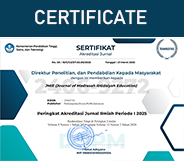ANALYSIS OF INTENSITY OF PLAYING ONLINE GAMES AND PARENTS' ATTENTION TO CHILDREN'S SOCIAL SKILLS IN ELEMENTARY SCHOOL
Abstract
Online games that are overgrowing and a favorite of children have had positive and negative impacts. The existence of the media causes many problems. If parents are negligent in supervising children, it will undoubtedly result in game addiction. Children who are already addicted to online games will experience several accompanying effects. These effects affect children's motivation, learning achievement, and social skills. Even though these things should exist in children in their current development period, this study aims to determine whether there is a relationship between the intensity of online games and parents' attention to the social skills of elementary school children. This type of research is quantitative research with a survey method. The subjects of this study were 246 elementary school students spread across the city of Yogyakarta. Sampling from the study population was carried out using a proportional random sampling technique, namely the method of taking samples from members of the people using random methods without regard to strata in the population. Data collection techniques using a questionnaire. Data analysis technique using Regression statistical techniques. The study's results stated that the relationship between online games and social skills, parental attention and social skills, and the relationship between the two towards social skills were fragile.
Keywords
Full Text:
PDFReferences
Ahmadi, A. (2009). Psikologi Umum, edisi revisi. Yogyakarta: Pustaka Belajar
Ahyar, M. (2019). Game Simulasi Desain Model Dan Modifikasi Mobil Dua Dimensi Berbasis Android. Ubiquitous: Computers and Its Applications Journal, 2, 39–44. https://doi.org/10.51804/ucaiaj.v2i1.39-44
Alkornia, S. (2018). Persepsi Orang Tua Mengenai Pelaksanaan Pendidikan Kesehatan Reproduksi Untuk Anak Usia Dini. Proceedings of the ICECRS, 1(3), v1i3-1373.
Andriani, W., Subandowo, M., Karyono, H., & Gunawan, W. (2021). Learning loss dalam pembelajaran daring di masa pandemi corona. Seminar Nasional Teknologi Pembelajaran, 1(1), 484–501.
Ariantoro, T. R. (2016). Dampak Game Online Terhadap Prestasi Belajar Pelajar. JUTIM (Jurnal Teknik Informatika Musirawas), 1(1).
Arikunto, S. (2010). Metode peneltian. Jakarta: Rineka Cipta.
Barros, B., Marisa, F., Wijaya, I. D., Informatika, J. T., Borobudur, J., Malang, U. W., & Malang, P. N. (2018). Pembuatan Game Kuis Siapa Pintar. 3(1), 44–52.
Chatib, M. (2012). Orangtuanya Manusia: Melejitkan Potensi danKecerdasan dengan Menghargai Fitrah Setiap Anak. Kaifa.
Chen, C. hsin, Castellanos, I., Yu, C., & Houston, D. M. (2020). What leads to coordinated attention in parent–toddler interactions? Children’s hearing status matters. Developmental Science, 23(3), 1–14. https://doi.org/10.1111/desc.12919
Dalimunthe, C. E. (2019). Pendekatan Teknik Konseling Self dalam Mengatasi Kecanduan Game Online Melalui Layanan Konseling Individual di SMP Al-Hidayah Medan. repository.uinsu.ac.id.
Entertaiment Softwere Association. (2015). 22 chart & Graphs On Vidio Games & Youth Violace. A Study on Thinking Strategy Between Experts and Novices of computer Games. Computer in human behavior.
Fajri, C. (2012). Tantangan Industri Kreatif-Game Online di Indonesia. Jurnal ASPIKOM, 1(5), 443. https://doi.org/10.24329/aspikom.v1i5.47
Fatimah, E. (2006). Psikologi Perkembangan: Perkembangan Peserta Didik. CV. Pustaka Setia.
Gerungan, W. A. (2010). Psikologi Sosial, Bandung: PT Refika Aditama. Refika Aditama.
Henry, S. (2010). Cerdas dengan Game: Panduan Praktis bagi Orangtua dalam Mendampingi Anak Bermain Game. Gramedia Pustaka Utama.
Herbert, E. W., & Baer, D. M. (1972). TRAINING PARENTS AS BEHAVIOR MODIFIERS: SELF‐RECORDING OF CONTINGENT ATTENTION 1. Journal of Applied Behavior Analysis, 5(2), 139–149.
Jarolimek, J. (1977). Social Competencies and Skill: Learning to Teach as an Intern. McMillan Publishing.
Kartadinata, S. (1998). Bimbingan di Sekolah Dasar. Bandung. Maulana.
Kustiyani, R. (2021). Adiksi Game Online Mobile Legend Pada Anak. Jurnal Psikologi Terapan (JPT).
McIntyre. (2005). Teaching Social Skills to Kids Who Don’t Have Them Now Behavior Advisor. Merril, an Imprint of Macmillan Publishing Company.
Meggitt, C. (2013). Understand Child Development: Memahami Perkembangan Anak. Hodder Education.
Napal Fraile, M., Peñalva-Vélez, A., & Mendióroz Lacambra, A. M. (2018). Development of digital competence in secondary education teachers’ training. Education Sciences, 8(3), 104.
Nasution, S. (2008). Asas-Asas Kurikulum. Jakarta: Bumi Aksara, cet. Kedelapan.
Niklas, F., Cohrssen, C., & Tayler, C. (2016). Parents supporting learning: a non-intensive intervention supporting literacy and numeracy in the home learning environment. International Journal of Early Years Education, 24(2), 121–142. https://doi.org/10.1080/09669760.2016.1155147
Nisa, A. (2017). Pengaruh perhatian orang tua dan minat belajar siswa terhadap prestasi belajar ilmu pengetahuan sosial. Faktor: Jurnal Ilmiah Kependidikan, 2(1), 1–9.
Osland, Joice. S., David, K., & Rubin, I. (2002). The Organizational Behavior Reader. Prentice Hall.
Rohman, K. (2018). Agresifitas Anak Kecanduan Game Online. Martabat.
Seefeldt, C., & Nita Barbour. (1986). Early Childhood Education. An Introduction. Third Edition. Macmillan College Publishing Company.
Setiawan, A. (2021). Pendidikan Karakter pada Peserta Didik di Masa Pandemi Covid-19 Berbasis Keluarga. Jurnal Ilmiah Mandala Education, 7(1).
Siregar, N. I. (2014). Pengaruh Video Game Berunsur Kekerasan Terhadap Perilaku Agresif Remaja (Kasus Remaja di SMK Wiyata Kharisma, Kecamatan Kemang, Kabupaten Bogor). Makalah Kolokium.
Slameto. (2010). Belajar dan Faktor-faktor yang Mempengaruhinya. In Rineka cipta.
Sugiyono, M. P. P. (2007). Pendekatan Kuantitatif. Kualitatif, Dan R&D. Bandung: Alfabeta.
Sumanto. (2014). Psikologi Umum. Center of Academic Publishing Service.
Sumarni, N. (2019). PENGARUH PERHATIAN ORANG TUA DAN MOTIVASI BELAJAR TERHADAP PRESTASI BELAJAR ILMU PENGETAHUAN SOSIAL SURVEI PADA SISWA SMPN DI KABUPATEN SERANG. E-Jurnal Mitra Pendidikan, 3(10), 1285–1297.
Ulya, L., Fatuhurohman, I., & Sucipto. (2021). Analisis Kecanduan Game Online Terhadap Kepribadian Sosial Anak. Jurnal Educatio FKIP UNMA, 7(3), 1112–1119. https://doi.org/10.31949/educatio.v7i3.1347
Vera, N. A., & Netrawati, N. (2019). Addicted To Online Games Among Teenagers And Their Implication for Counseling Service. Jurnal Neo Konseling.
Virlia, S., & Setiadji, S. (2017). Hubungan Kecanduan Game Online Dan Keterampilan Sosial Pada Pemain Game Dewasa Awal Di Jakarta Barat. Psibernetika, 9(2).
Wiener, J., Biondic, D., Grimbos, T., & Herbert, M. (2016). Parenting stress of parents of adolescents with attention-deficit hyperactivity disorder. Journal of Abnormal Child Psychology, 44(3), 561–574.
DOI: http://dx.doi.org/10.32934/jmie.v6i2.487
Refbacks
- There are currently no refbacks.

This work is licensed under a Creative Commons Attribution 4.0 International License.
Copyright © 2017, JMIE: Journal of Madrasah Ibtidaiyah Education, p-ISSN: 2580-0868, e-ISSN: 2580-2739
Indexed By:





